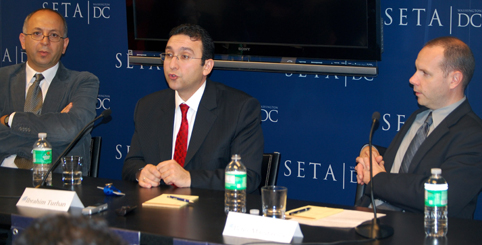A Panel Discussion with Ibrahim Turhan, Peter Mandaville, and Cemil Aydin. On Friday, October 08, 2010, SETA Foundation at Washington DC, Ali Vural Ak Center for Global Islamic Studies, and Center for Global Studies at George Mason University, hosted Ibrahim Turhan, Deputy Governor of the Central Bank of Turkey and Peter Mandaville, Co-Director of Center for Global Studies at George Mason University. The event was moderated by Cemil Aydin, Director of Ali Vural Ak Global İslamic Studies Center at George Mason University.
A Panel Discussion with Ibrahim Turhan (Deputy Governor of Central Bank of Turkey) Peter Mandaville (Co-Director of Center for Global Studies, George Mason University) Cemil Aydin (Ali Vural Ak Global Islamic Studies Center, George Mason University) Event Summary Friday, October 08, 2010 By Natalie Lopez
On Friday, October 08, 2010, SETA Foundation at Washington DC, Ali Vural Ak Center for Global Islamic Studies, and Center for Global Studies at George Mason University, hosted Ibrahim Turhan, Deputy Governor of the Central Bank of Turkey and Peter Mandaville, Co-Director of Center for Global Studies at George Mason University. The event was moderated by Cemil Aydin, Director of Ali Vural Ak Global İslamic Studies Center at George Mason University.
Peter Mandaville: What is the Turkish perspective on G-20?
Ibrahim Turhan: Up until the Asian crisis in the late 1990s, we had been accustomed to crises but it was different this time around given the global impact of the crisis.The G-20 was established as a way for the developed economies to contain the effects of crises in the less developed economies. The realization that we needed a new financial architecture was voiced by the IMF and the G-20 was established. With the most recent crisis as the US has been at the epicenter of the crisis, the G-20 was reinvented. The developed countries' concern shifted from simply "containing the periphery" to "sharing the burden". We have had "international" institutions but not truly "global" ones. "It is not easy to transition to the new reality." With the emerging economic powers, the center is shifting from the core to the periphery. The G-20 can be the platform to discuss and adjust to this new reality.
Turkey is the 17th largest economy and set to become the 16th next year according to the unofficial numbers. You may consider Turkey as part of the South. But Turkey's ties are mainly to the North. Turkey is the only south & east country with most of its ties to the North. The growing young population is an important asset as well as the 11% economic growth rate, which has surpassed even China this year. Instead of strengthening the South-South relations only, Turkey can play a unique role by contributing to North-South cooperation.
There are risks, however, such as growth and interest rate differentials, which may cause capital flows to go towards emerging markets. Emerging markets may not be able to absorb these flows. Emerging economies may devaluate their currencies to make up for the adverse effects of distortion in capital flows in and out. Advanced economies have been consumers and importers during the last decade while the emerging economic markets have been heavily dependent on exports. If emerging economies are given more institutional power in international organizations, they may be more inclined to balance their exports and imports. We are in a situation where the developed economies do not want to give up their some of their power in institutions such as the G-20 and emerging economies are blaming them for this, refusing to cooperate on global financial issues.
Peter Mandaville: Turkey's ties are diversifying and the country is establishing more linkages to India, China, and the Middle East. What is Turkey's geo-economic posture?
Ibrahim Turhan: Two thirds of Turkish trade was with the EU and US until the most








